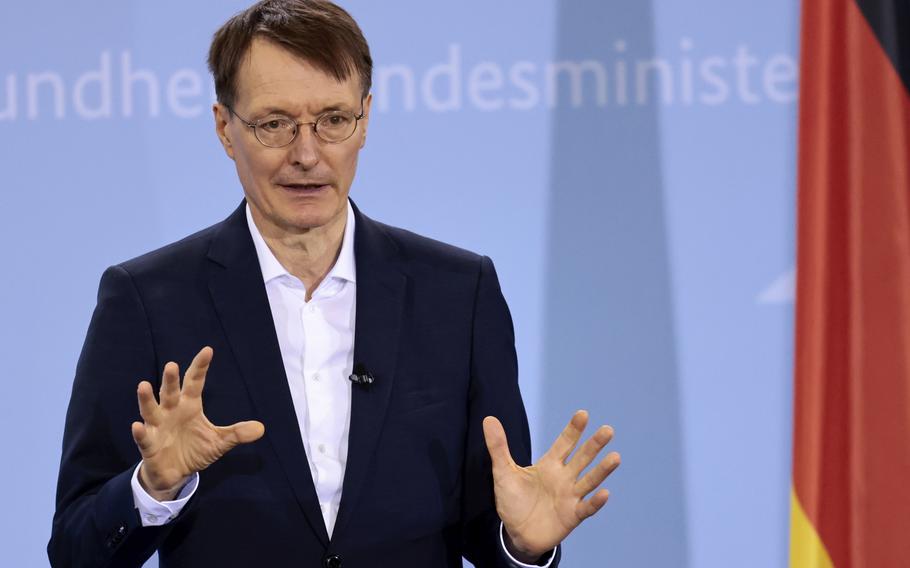
German Health Minister Karl Lauterbach attends a handover ceremony in Berlin, Germany, Wednesday Dec. 8, 2021. (Hannibal Hanschke/Pool via AP)
BERLIN - After the chancellor himself, one of the most scrutinized positions in Germany's new government is the health minister, a doctor who is a household name and has received death threats for his stern advice on handling the pandemic.
Karl Lauterbach, a 58-year-old with degrees from Harvard in public health and epidemiology, became a kind of Anthony Fauci equivalent as the pandemic unfolded and he was constantly in the public eye on German TV and in social media. He became known for his strict prescriptions for how Germany could protect itself from the spread of the disease.
There was even a "wewantkarl" Twitter hashtag supporting his candidacy in the run-up to his appointment.
Now he oversees the sprawling, $56 billion Health Ministry as the country faces another surge of coronavirus infections and hospitalizations, and the prospect of more omicron cases. On Friday, the parliament passed a vaccine mandate for all health-care workers starting March 15.
"Such a vaccine mandate is necessary because it is completely unacceptable that at the end of the second year of this pandemic, people who live in care homes die unnecessarily because workers there are unvaccinated," he told the Bundestag.
Lauterbach's immediate task is seeing to 30 million more vaccinations by year's end - whether first, second or booster doses - a goal set under the previous government that he confirmed he will carry out.
The hoped-for result is a question of logistics - the ministry is responsible for getting supply to the states - and also willingness. With uptake flagging well below what many scientists say is needed to reach herd immunity, a vaccine mandate for the general public is still in the cards.
So far, 71 percent of Germans have received at least one dose of a vaccine, but there remains a vigorous anti-vaccine movement that stages regular protests. There are opinion polls, however, that show increasing support for mandatory vaccinations, including one suggesting that some 57 percent of the population is in favor.
Mandates are controversial in Germany, and Lauterbach's critics say his pandemic predictions can be overblown - and they sometimes have been. He has had to walk back his opposition to sporting events, even without crowds, which was just one of the stringent measures he advocated for.
Despite Lauterbach's expertise and prominence, it wasn't originally clear he would even get the job, with the local media full of reports that party leaders feared that his uncompromising style meant he wouldn't be a team player.
Yet Lauterbach showed his ability to toe the line in November when he supported a bill that did away with the existing legal basis for lockdowns and closures, replacing it with new vaccination and testing requirements for much of public life - in contradiction to his past stances.
"The law that ends the health emergency has many measures that will help states tackle the pandemic," he said at the time on Markus Lanz's political talk show.
The change led to some confusion and delays in rolling out new rules, leaving state leaders scrambling to find the legal authority to respond to a record-breaking fourth wave of infections that has seen tens of thousands of new daily cases. Many of those measures were restored with Friday's legislation.
At a news conference after his swearing-in on Wednesday, Lauterbach promised that policy would be dictated by science. "Health policy, as I see it, can only be successful when it's anchored in evidence-based medicine," he said.
Jonas Schmidt-Chanasit, a virologist at the Bernhard Nocht Institute for Tropical Medicine, however, cautioned against stressing Lauterbach's scientific background over his political present.
"It's important to know that he's a politician. He argues with political intentions," Schmidt-Chanasit said. "The separation between science and politics is extremely important because there are, of course, conflicts of interest."
Lauterbach may end up backing positions that his Social Democratic Party (SPD) supports even if they don't square with his scientific background, Schmidt-Chanasit warned.
The pandemic is just one of the serious health challenges confronting Germany. It faces an aging population, a nursing shortage, financially burdened hospitals, a lack of resources for research and public health, and a need to digitize, not to mention issues of pay and working conditions in the health sector.
"When you're [health] minister, everything gets unloaded on you. Other than the chancellor, it's one of the most challenging jobs - and not only because of the pandemic," said Ulla Schmidt, a retired SPD lawmaker and the party's last health minister, serving from 2001 to 2009.